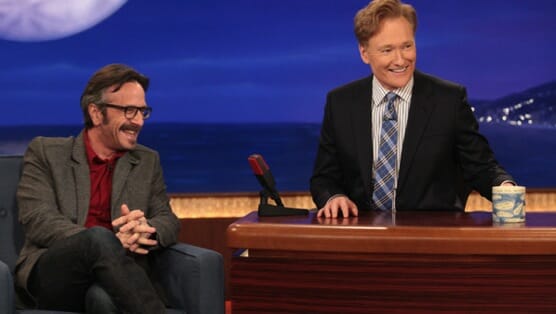
“So what’s new with Marc Maron?” Throughout most of the uneven second season of Maron on IFC, that question has yielded an unfortunate response most Thursday nights: “Not much.”
Out of a dozen, there have been some solid episodes (particularly “Radio Cowboy” two weeks ago), strong guest appearances (Caroline Rhea, Ray Romano, and others), and the smart ruminations about fame, age, and relationships that made Maron worth watching week after week. But overall, the show has experienced growing pains as it tries to move beyond the well-traveled ground around Marc’s home in LA.
But this week, quick-fire cameo-ing Conan O’Brien is the one asking the questions, Marc Maron himself is behind the camera doing the directing, and new-old faces are turning up left and right to add color. For the penultimate episode of his sophomore season, Maron has called upon a cavalcade of comedy stars, most among the old guard, to discuss an age-old problem. What’s new is the audience watching O’Brien interview a jumpy Maron—a funny “college-kids-doing-drugs” joke, unfortunately—is old.
“The Joke” deals with what has become a nightmare scenario for comics—the (potentially unwitting) recycling of other comics’ old material and the fallout that comes from the cardinal sin of stealing a joke. This has always been a platform issue for Maron, who famously brought both Dane Cook and Carlos Mencia onto the WTF Podcast on separate occasions to make them stand trial for their sins.
The victim of Marc’s mistake is Bobby Mendez, an ex-con played by the corpulent Joey “Coco” Diaz. He’s gigantic in a multitude of ways, and the sheer size of his personality (and gut) fill the scenes he’s in with a sense of the dark desperation that sits just behind the curtain at the old stomping grounds.
It’s fitting that real-life Marc’s first book was titled The Jerusalem Syndrome: My Life as a Reluctant Messiah because, throughout two seasons on TV, he’s picked up plenty of castoffs, bid them to throw down their drugs, and follow him home. In the case of Mendez, he’s given less of a choice in the matter, but Marc feels it necessary to pay a penance for his comic sin.
There are other fine side-plots—Marc’s meta-meeting with Jonathon Groff goes about as well as can be expected (@badtvpilot ideas would be far more watchable than any of the options Groff proposes), and Bill Burr uses the podcast pulpit to make sure we know what an egregious error Marc has made—but this week is really about Mendez, who is perhaps the most compelling of Maron’s castoff companions. Like so many others who find their way into Maron’s orbit, he’s a caricature, sure, but it’s a caricature that doesn’t seem all that out of place in the grander scheme of comedians past and present.
It’s an overgeneralization to emphasize how much of comedy comes from real pain, but there are plenty of comedians whose tortured pasts have produced the finest material of comedy’s “sadist generation.” Many of the guys Maron’s sharing the screen with this week can attest to that. But Maron occupies a different space from the still-using Mendez because he, unlike many, got out. He left his pain behind and now gets to use it for his act. But others were far less fortuitous.
Sure, it’s silly for Marc to be awoken by bad dance music and a coked-up Kyle ready to go directly to “dead” without passing Go and collecting his $200. But it’s more sad than anything, and the sadness that undergirds comedy’s collective past and the long nights is on full display this week—no matter how many breakfasts Bobby Mendez makes the next morning.
The old clubs—where doing a few bumps before a set—are empty. Those of Marc and Mendez’s generation who embraced that life too fiercely are gone. The “rules” survive, but Marc seems to be more upset about his accidental joke thievery than anyone else does. And either way, it’s not 3 A.M., they’re not at a diner, and Marc’s not drunk.
To my mind, the new scene, a house party, is reformed, or at least “in recovery.” And one thing that we’ve learned about Marc Maron through two seasons is that, whether he realizes it or not, he fits there now. He knows he’s not the old-school radio host rendered irrelevant by new media, but he still hasn’t quite figured out yet that he’s not the old comedian who bares his dark soul on stage, either. And while it’s ground well-tread here, reconciling reality with his own ideas about the place he occupies in comedy and in life—or integrating his shame into his own personality, if you will—is a path worth walking a few more miles in Maron’s shoes.
“If you had paid for this show and witnessed this, would you say, ‘That guy sucked?’” Maron asks the crowd assembled at the in-house set. “Or would you say, ‘I hope that guy’s OK.’” Honestly, “The Joke” wasn’t quite The Wire. It was just OK. But there’s nothing wrong with that.
John Vilanova is a New York and Philadelphia based writer and academic currently serving as the managing editor of Philadelphia Style magazine. His work has appeared in publications including Paste, Rolling Stone, Vogue, and others. Follow him on Twitter.